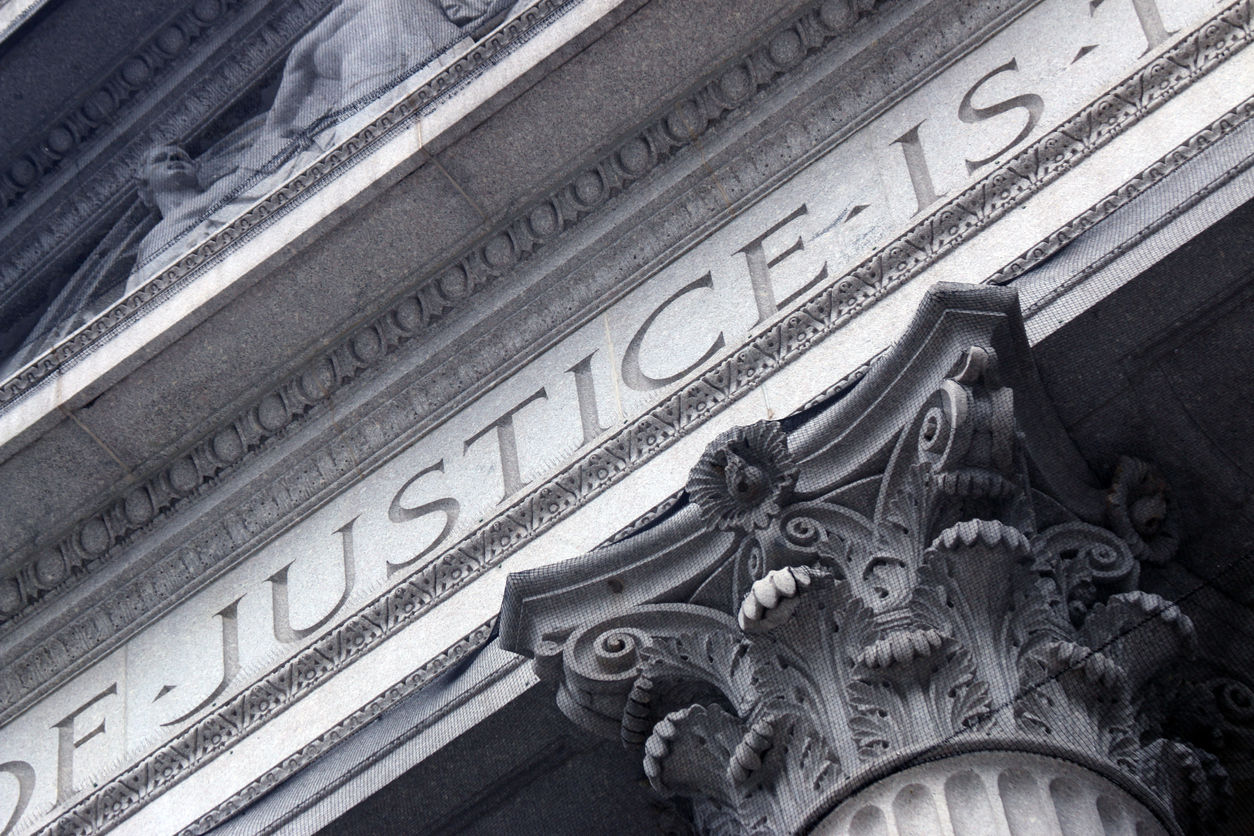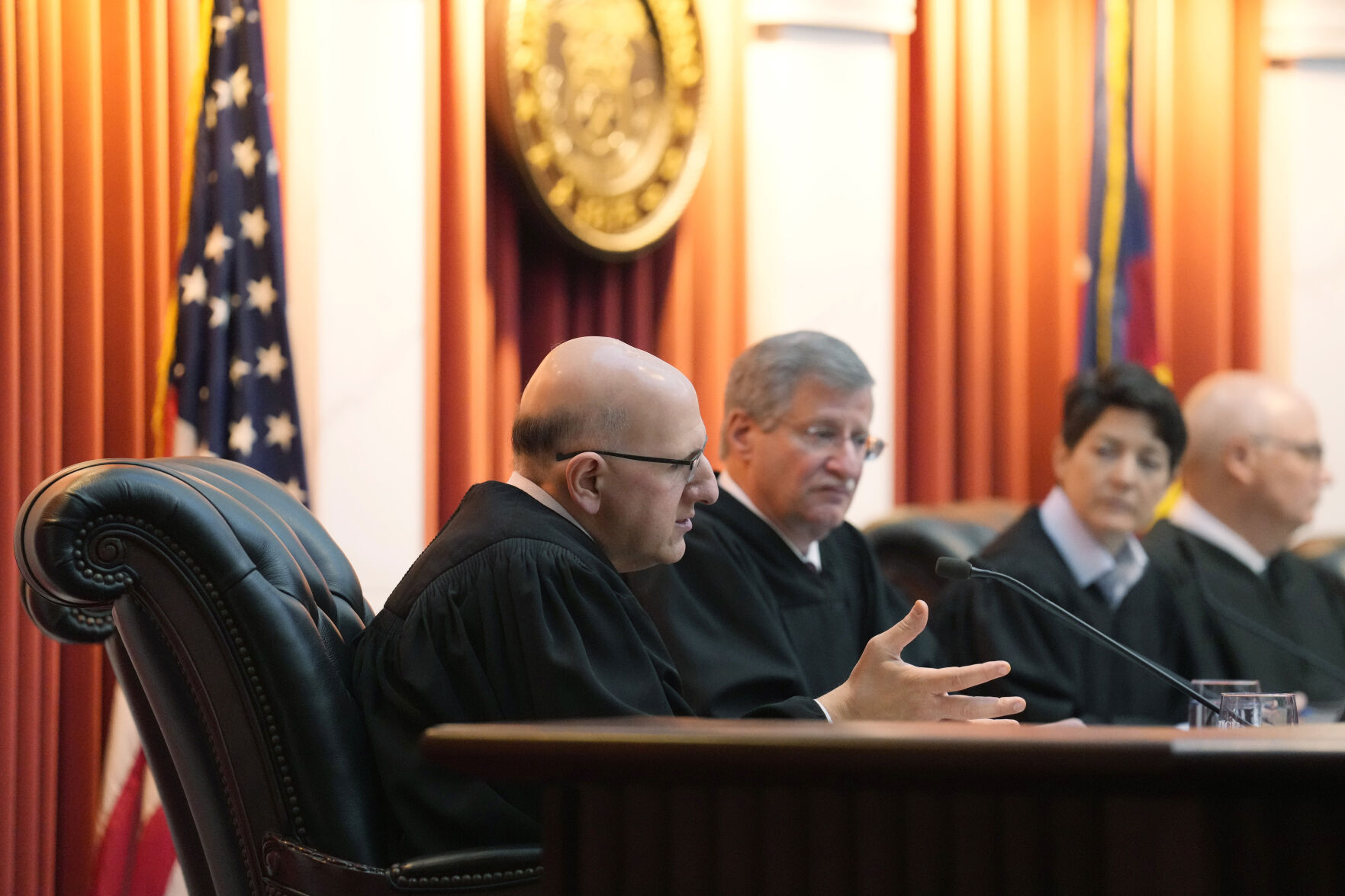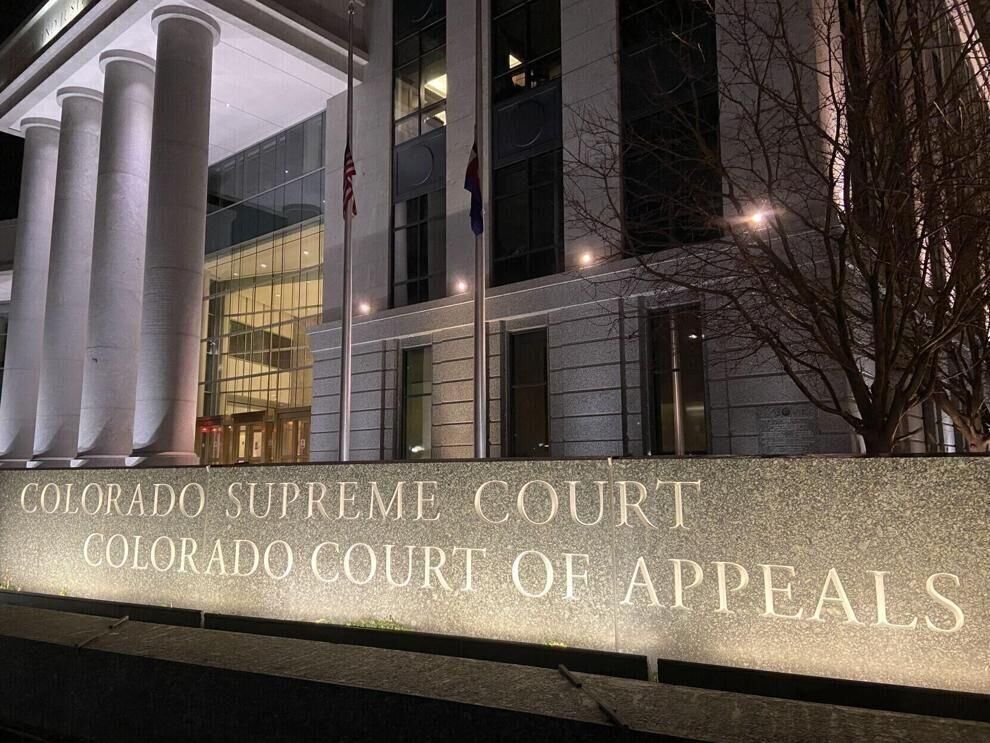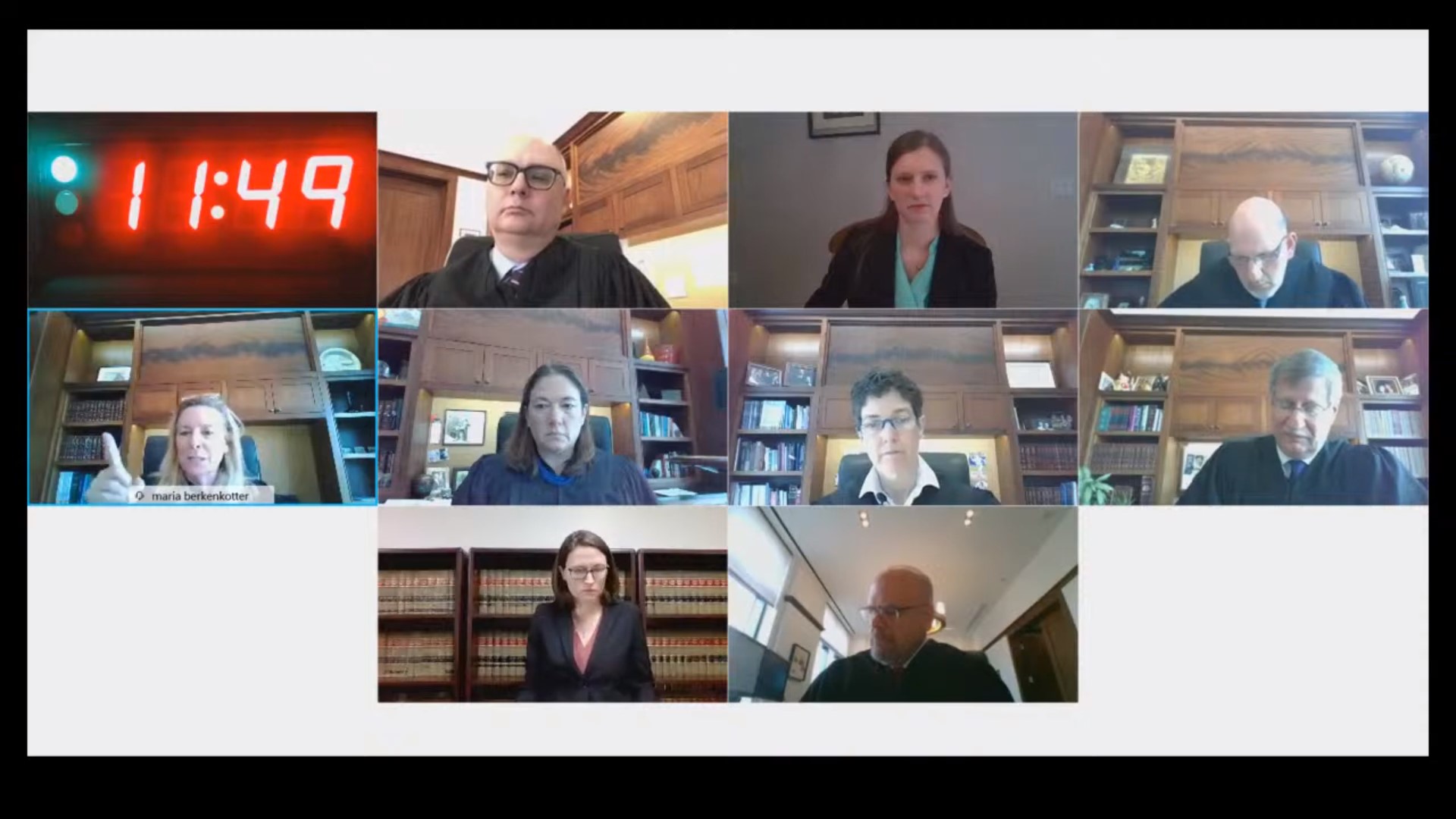Rapid developments in Trump disqualification case close out year | COURT CRAWL

Welcome to Court Crawl, Colorado Politics’ roundup of news from the third branch of government.
The big news at the end of the year was the Colorado Supreme Court’s decision to disqualify the leading Republican presidential candidate from the ballot on constitutional grounds, but a flurry of other decisions were handed down in December, as well.
Trump’s eligibility question heads from Colorado to D.C.
? In December, the Colorado Supreme Court did something no one else has done to any former president or presidential candidate: found Donald Trump engaged in insurrection in his attempt to halt the certification of the 2020 election, meaning he is constitutionally disqualified from appearing on the primary ballot.
? The decision was 4-3, with Justices Monica M. Márquez, William W. Hood III, Richard L. Gabriel and Melissa Hart joining the majority opinion – which was unsigned, or “per curiam,” ostensibly because that is the court’s practice in ballot eligibility challenges. The case quickly shot through the court system thanks to Colorado’s expedited process for elections challenges, with little more than three months separating the filing of the case from its resolution by the Supreme Court.
? The dissenting justices had doubts about whether it was proper to use Colorado’s existing procedures for answering an unprecedented constitutional question. Justice Carlos A. Samour Jr. went so far as to call the case a “procedural Frankenstein” that “doesn’t resemble anything I’ve seen in a courtroom.”
? Samour and Chief Justice Brian D. Boatright suggested Trump wasn’t afforded the appropriate level of due process, but multiple legal experts were unsure what more the dissenters wanted to happen here.

? In response, predictably, the justices began receiving threats. Also, predictably, reaction to the decision split along ideological and partisan lines in Colorado.
? Last week, the U.S. Supreme Court agreed to hear the case on a fast timetable, scheduling oral arguments for early February. Here is what some scholars who have been closely following the legal challenge will be looking for:
“To the extent that there are tea leaves to be read, the scheduling order suggests that there is a majority to reverse the Colorado Supreme Court. If the justices were inclined to affirm, they would probably want to do so very quickly, so that Trump’s name could be taken off the ballot in early primary and caucus states.” –Prof. Michael C. Dorf of Cornell Law School
“I had expected a more demanding briefing schedule and that the oral argument would have been held sometime in mid or late January, and not as late as Feb. 8, 2024. I do not think this late schedule is good for Trump’s team.” -Associate Prof. Seth Barrett Tillman of Maynooth University
In other Supreme Court news
? After the Colorado Supreme Court told Rifle to explain why its municipal code should be allowed to punish people 18 times more harshly for theft than state law does, the city backed down and begrudgingly changed its ordinance.
? Once again, the justices sided against the office of District Attorney Linda Stanley in central Colorado, rejecting a request to overturn a suppression order because Stanley’s office failed to address all of the necessary legal grounds.

Year in review
? Colorado Politics looked at the most consequential events in Colorado’s court system that happened in 2023, including the two cases from the state that the U.S. Supreme Court decided, the first-ever censure of a Colorado chief justice and multiple challenges to newly enacted laws under the federal constitution.
Heard on appeal
? An Eagle County judge didn’t use the tools available to him to lawfully extend a defendant’s speedy trial date. Because of the violation of the defendant’s rights, the state’s Court of Appeals overturned his convictions.
? Police departments that didn’t offer breath tests to DUI suspects as an option early in the COVID-19 pandemic were acting in accordance with the law, the Court of Appeals ruled.
? Arapahoe County jurors listened to an irrelevant legal theory from the prosecution at the beginning of trial and convicted the defendant based on the same irrelevant theory. The Court of Appeals overturned the conviction.
? Preserving “neighborhood character” was a good enough reason why Lakewood could pass a zoning ordinance that only restricted Colorado Christian University’s housing, the Court of Appeals decided.

? A criminal defendant should have been able to argue he ingested weed that, unbeknown to him, was laced with a stimulant that made him act disorderly. Consequently, the Court of Appeals ordered a new trial.
? The Court of Appeals declined to go against precedent and overturn Colorado’s caps on certain types of damages as unconstitutional.
? Claims under Colorado’s minimum wage law can be filed during a longer statute of limitations than the one built into the state’s general wage law.
? Safeway attempted to deny workers’ compensation benefits to an 82-year-old employee who was injured while trying to stop a shoplifter, but the Court of Appeals rejected the grocery chain’s arguments.
? Colorado’s labor department misstated how long a company had to appeal its wage decision, leading the Court of Appeals to rule the company didn’t miss the legal deadline after all.
? The Court of Appeals determined a Weld County judge acted appropriately when he ejected a disruptive observer from the livestream of a criminal trial, but one appellate judge warned about extending constitutional protections for physical courtrooms to “virtual” ones.

? A Boulder County criminal defendant wasn’t unconstitutionally forced to choose between his rights to counsel and to a speedy trial and, furthermore, the trial judge wasn’t obligated to step in and appoint a new lawyer when the self-represented man performed badly as his own defense attorney.
In federal news
? A bizarre announcement blasted over the phone line in the middle of a defendant’s trial warning about “criminals” who want to “defund the police.” The U.S. Court of Appeals for the 10th Circuit said the trial judge handled the disruption appropriately.
? The 10th Circuit underscored that federal prisoners suing government officials for violating their constitutional rights can’t have their lawsuits heard thanks to the U.S. Supreme Court’s precedent – to the chagrin of frustrated trial judges.
? A Greeley detective committed no constitutional violation when he walked onto a man’s front yard without a warrant and pulled him out of the car for a minor traffic infraction, the 10th Circuit ruled.
? A former Denver Public Schools employee failed to show she was fired because she spoke out against racial discrimination.
? Three 10th Circuit judges spoke to lawyers about how they should approach oral arguments, the importance of formatting appellate briefs and why the 10th Circuit grants all-judges review to so few cases.
? After hearing arguments about why a new Colorado law regulating the affordability of EpiPens may be unconstitutional, a federal judge agreed the program likely violates the “takings clause,” but he couldn’t grant relief before the law took effect.

? Following his dismissal of the Archdiocese of Denver from the case, a federal judge conducted a trial about whether Colorado’s universal prekindergarten program violates the rights of two Catholic preschools by requiring them not to discriminate against LGBTQ families in order to receive state money.
? Another federal judge has added his voice to the complaints about “frustrating” delays that people incarcerated for sex offenses are experiencing in obtaining treatment from the state, which is a necessary condition for their parole eligibility.
Vacancies and appointments
? The governor has appointed state prosecutor Arturo G. Hernandez, a former corporate lawyer and assistant U.S. attorney, to succeed retiring Chief Judge Don Quick in the 17th Judicial District (Adams and Broomfield counties).
? Child neglect and juvenile delinquency attorney Jeffrey D. Ruff will succeed retiring District Court Judge Roberto Ramírez, also in the 17th Judicial District.
? The governor also selected Magistrate Christina M. Apostoli for a seat on the Arapahoe County Court, where she succeeds now-District Court Judge Chantel E. Contiguglia.
? Finally, Magistrate Elizabeth J. McCarthy, a former assistant attorney general and municipal prosecutor, has been appointed to the Denver Juvenile Court, succeeding now-Court of Appeals Judge Pax Moultrie.
? The chief justice has chosen District Court Judge Erin Sokol to succeed outgoing Chief Judge William Bain in leading the Fourth Judicial District (El Paso and Teller counties).
? Denver’s mayor has appointed Judge Kerri Lombardi to be the presiding judge of the Denver County Court. She succeeds Judge Nicole M. Rodarte in the role.
Miscellaneous proceedings
? A man crashed his car in downtown Denver, broke into the Ralph L. Carr Colorado Judicial Center early in the morning, allegedly held a security guard at gunpoint and started a fire, damaging the Colorado Attorney General’s Office. A mental health crisis may have motivated the behavior.















